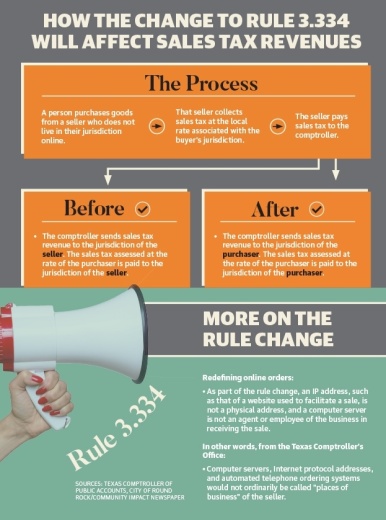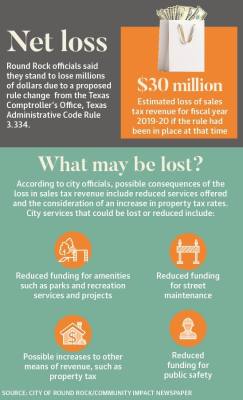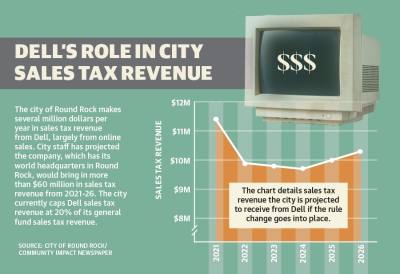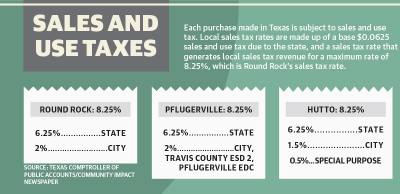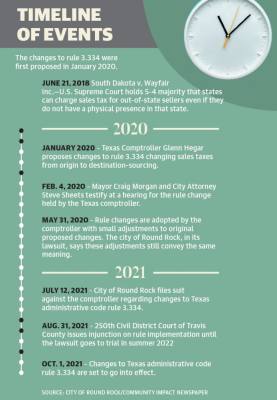At issue is the assignment of sales taxes to jurisdictions, which are paid to the jurisdiction in which a seller is located by the Texas Comptroller’s Office. Changes made by Texas Comptroller Glenn Hegar to Rule 3.334 of the code would have the sales tax be assigned to the jurisdiction of the purchaser, including for out-of-state transactions.
While neighboring cities such as Pflugerville and Hutto say they will not see much change, if any, Round Rock and other Texas cities are suing the Texas comptroller because the changes would have serious implications for its revenue.
The rule change was slated to go into effect Oct. 1, but the 250th Civil District Court of Travis County on Aug. 31 issued an injunction prohibiting its implementation pending a final hearing anticipated for summer 2022. The injunction came due to an agreement between Round Rock and the comptroller.
Should officials decide the rule can go into effect, Jason Ball, Round Rock Chamber president and CEO, said it will also have a large impact on smaller businesses and the type of economic development agreement that brought Dell Technologies Inc. to Round Rock in the first place.
“This step effectively nullifies an agreement that brought a company here that has changed Central Texas; it will have [big] impact to small business, and I believe impede startup activity in an unnecessary way,” Ball said.
Just over 40% of total revenue to the city is anticipated to come from sales tax in the next budget year, according to the city’s projected budget for fiscal year 2021-22, which goes into effect Oct. 1. Included in that amount is an average $10 million per year over the next six years from Dell—much of it via online sales.
Round Rock also estimates losing sales tax revenue could result in funding cuts to city services and increased property taxes for residents.
To combat what Round Rock staff said could result in extensive revenue losses, the city filed a lawsuit against the comptroller July 12.
The city declined comment from the mayor regarding the rule change’s impact outside of what was shared in the statement, citing ongoing litigation.
Explaining the lawsuit
The lawsuit against Hegar’s office argues the rule change is in direct conflict with the Texas Tax Code. It cites tax code language that it claims is at odds with the comptroller’s rule change because it uses definitions for what a place of business is. The suit argues the comptroller specifically categorizes online stores as not being places of business, and the city alleges the tax code has not been amended to match.
Additionally, the suit states the rule change makes determining where sales tax should be assigned unnecessarily complicated for small businesses when filing their sales tax returns.
Cities that have also filed similar lawsuits against the comptroller include Coppell, Humble and DeSoto.
Hegar’s office declined to be interviewed regarding litigation, but he alleged in a 2020 article published on the comptroller’s website that retailers and cities are using the current tax sourcing rules and economic development agreements to “snatch sales tax revenue from other communities.” In the suit from Round Rock, Hegar is accused of “targeting online commerce in Texas and the cities that rely on the resulting sales tax revenue” in adopting the changes to this sales tax rule.
Essentially, the city argues in its suit that Hegar’s office is overstepping his authority, especially since similar bills introduced this year by the 87th Texas legislative session were ultimately declined, which resulted in no change to the state’s tax code.
“Nevertheless, the comptroller attempts to unlawfully accomplish with rulemaking what the legislative branch of Texas government refused to enact,” the city argues in the lawsuit. The city declined to discuss the lawsuit, citing ongoing litigation.
At a July 8 Round Rock City Council meeting, officials approved an additional $150,000 in funding to allow legal proceedings to advance to the Texas Supreme Court.
The move boosted the city’s budget for the suit to $300,000, an amount city officials have said is expected to cover the complete cost of litigation. Dell, which has its global headquarters in Round Rock, is expected to bring in more than $60 million in sales tax revenue to the city from 2021-26, according to the city’s proposed budget for the 2021-22 fiscal year. The average projected revenue from Dell alone is about $10 million per year.
In the lawsuit, which is now anticipated to go to trial in summer 2022, the city estimated a loss of $30 million based on tax revenue for fiscal year 2019-20 if the rule had been in effect—which is more than half of the $52.6 million Round Rock received in sales tax revenue that year.
Much of the total estimated loss comes from Dell, and Bustilloz said there is no other generator of business activity in Round Rock that compares with Dell.
Representatives for Dell declined to comment on the matter and stated the company is not party to the lawsuit against the comptroller.
Impacting business
Ball said the rule change could hinder economic development in Texas cities and become burdensome for businesses trying to get started.
“Think about what the modern startup economy looks like,” Ball said. “Now, most small businesses start out immediately from day one with a website and order availability and fulfillment on the internet. Now, all of a sudden, anything that is already subject to sales tax would then have to be assessed at a destination.”
Ball said this may present difficulties at the startup phase, when smaller businesses will have to make software investments to connect their point of sale with the appropriate databases to steer sales tax to the jurisdiction of the purchaser when it comes time to pay them to the comptroller each quarter.
Some local business owners who recently began operations this year said they were unaware of the impending shift in sales tax sourcing, which will require changes to return filing methods to the comptroller’s office—whether through updates in software or by manual entry—Ball said.
Joe Ramos, a lifelong Round Rock resident, opened an online record store Aug. 1. Specializing in “cassette-era” classic rock, customers can purchase vinyl albums online from The End of Silence Record Store.
Ramos said it is unclear to him how the rule change would affect his business, as he has not had to file a sales tax return yet, but he was not made aware of the change when he obtained his sales tax permit.
Kelsey Black, a small-business owner in Pflugerville, said she was also not aware of the rule change.
Black owns The Book Burrow, an independent bookstore that she operates out of her garage. While most of her sales occur in person, any orders placed on her website would experience the same as Ramos’.
Neighboring communities
Officials with the cities of Hutto and Pflugerville said they are not expecting any major impacts to their sales tax revenues, if at all.
Pflugerville public information officer Maggie Holman said in an email at present there are no known material impacts to the city.
Hutto Communications Manager Allison Strupeck said the diversity of the city’s emerging economy may help diminish many effects of the rule change Hutto might otherwise have seen. However in Round Rock, staff and officials are already starting to look at how the rule change will affect residents.
Ball said the impact to the city’s economy would be “devastating.”
The city’s 2020-21 budget includes 43% of revenue from sales tax, around $48.3 million. A Round Rock Chamber report states the city’s property tax rate is $0.144 lower because of sales tax. That lowers property taxes for the median homeowner by roughly 25%, according to the chamber.
Based on potential effects of the rule change, according to the press release announcing the lawsuit, services offered to citizens from departments that are largely funded through sales tax revenue—including parks and recreation, street maintenance and public safety—could see some reductions in funding.
City officials have declined to comment regarding the impact to future budgets in terms of a dollar amount, but Bustilloz said the impact would be “profoundly negative.”
As one means of preparation for fiscal year 2021-22, the city’s proposed budget includes a statement that it is saving the full allowable maintenance and operations, or M&O, yearly tax rate increment of 3.5% for the budget year in the event that the city needs to raise property taxes in the future to cover the loss of revenue. This is the annual increment which a city is allowed to increase its M&O rate each year with a rollover period of three years for unused portions.
According to the city, that action could result in an increase in the city’s proposed tax rate—slated for final adoption Sept. 9—that currently sits at $0.397 per $100 of valuation. With unused portions of this 3.5% increment available to roll over for three years, Chief Financial Officer Susan Morgan said that the city has “about $0.05” that it could add to its tax rate in future years.
Ball said the rule change is “frustrating,” and will have long-term impacts on economic development statewide.
“Even some of these communities that feel like they’re going to receive a windfall, I think are also simultaneously hurting their long-term economic growth prospects by taking one of their tools off the table,” Ball said.




